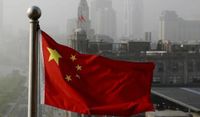On March 4, 2025, the Hong Kong conglomerate CK Hutchison Holdings made headlines by announcing its decision to sell its port business located near the Panama Canal to a consortium led by the American financial giant BlackRock. However, as of March 21, 2025, this deal has drawn significant ire from the Chinese government. President Xi Jinping has expressed dissatisfaction over this move, which many believe highlights a growing tension between China and the U.S. in the realm of international business.
According to a report from The Wall Street Journal, Xi Jinping's discontent stems not only from the sale itself but also from the fact that CK Hutchison did not seek prior approval from Beijing for the transaction. Sources familiar with the matter noted that Xi's comments reflect a broader concern over U.S. influence in Chinese dealings. This discontent represents more than mere friction; it signals a possible tightening of political control over significant transactions involving American investors.
The implications of this sale extend far beyond CK Hutchison. Analysts have indicated that such scrutiny may become the norm for future agreements between Chinese firms and American buyers, especially amid escalating tensions between the two nations. Reuters highlighted that Xi's criticism could be a signal of the Chinese government's intention to impose stricter regulations on major deals, especially as they pertain to national security interests.
This situation first gained traction when U.S. President Donald Trump welcomed the transaction, characterizing it as a "return of control" over the Panama Canal. His supportive remarks seem to have only deepened Beijing's suspicions, as officials assess the deal's potential implications on China's strategic interests.
The central government in China has directed its regulators to review the CK Hutchison-BlackRock deal, revealing Beijing's increasing displeasure with the transaction. The prompt government intervention reflects a belief that the Hong Kong company has capitulated to U.S. pressures, a notion that resonates deeply with Xi's intent to maintain a robust stance against foreign interference.
During a briefing regarding this deal, the Hong Kong and Macau Affairs Office criticized CK Hutchison's decision as a "betrayal of national interests." This comment underscores the increasing sensitivity of the Chinese government toward strategic assets and foreign investments that could be perceived as a concession to American enterprises.
In the wake of these developments, international relations experts, including Patricia M. Kim from the Brookings Institution, have analyzed the situation. Kim stated, "This reflects China’s overall strategy amid the trade war with the U.S., trying to balance a show of strength and protection of national interests, especially in front of the domestic audience." Her insights reflect a growing awareness within China of the need to project authority while navigating complex international landscapes.
Moreover, the scrutiny surrounding the CK Hutchison deal is symptomatic of a larger pattern. The ongoing pressure on companies like TikTok, owned by the Chinese company ByteDance, has also come into focus. Analysts anticipate that future government reviews will weigh heavily on the potential outcome of U.S.-China trade relations as they relate to technology and digital commerce.
As the situation unfolds, CK Hutchison has remained notably silent, only mentioning geopolitical tensions in their quarterly earnings report. The company has yet to provide a formal statement regarding the Chinese government’s criticism or the ongoing review by regulators, awaiting the outcomes of both the internal and external pressures exerted upon it.
Nevertheless, the pressure cooker environment illustrates a broader issue of confidence in U.S.-China business relations. While an agreement may have been finalized regarding the Panama Canal’s ports, the political climate surrounding such deals raises questions about future investments and acquisitions in both directions.
The CX Hutchison case may set a precedent that resonates within the corridors of power across international boundaries, potentially heralding a new era of politically charged transactions. As both nations pursue their economic agendas, observers are left to ponder the balance of power in global trade, especially as national security perspectives continue to shape cross-border corporate behaviors.
These developments signal an evolving narrative, one that underscores the increasing political motivations behind business transactions and suggests that U.S.-China tensions may result in cooler relations in financial markets for the foreseeable future.


